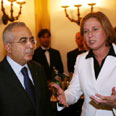
Livni: Israel should have accepted freeze deal
In rare joint interview with Fayyad, Opposition leader tells ABC, 'In choosing between building more buildings or making peace, I prefer to make peace'
WASHINGTON – In a rare joint interview with ABC's Christiane Amanpour, Opposition leader Tzipi Livni and Palestinian Prime Minister Salam Fayyad agreed peace was a common interest and that trust between the sides must be restored.
In the interview, which aired Sunday, Fayyad said the Palestinians want the Israeli "occupation" to end in 2011, while Livni said she believes that "a peace treaty between Israel and the Palestinians is in (the) Israeli interest, it's not a favor to President Obama.
"I believe that the relations between Israel and the United States are existential to the future of the state
of Israel," the Kadima party leader and former foreign minister told ABC.
Livni noted that during her meeting with Hillary Clinton on Friday, the secretary of state said the Americans would continue discussing the core issues with Israel and the Palestinians.
The opposition leader said Prime Minister Benjamin Netanyahu erred when he rejected a set of American guarantees in exchange for imposing another construction moratorium in the West Bank. "In choosing between building more buildings or making peace, I prefer to make peace," she said.
Addressing the settlement issue, Fayyad said Israel was violating international law by continuing to build in the West Bank. "In order to give the process the kind of credibility that's required is for us to really know, with precision, where it is that the government of Israel stands on the fundamental issue of what it is that's
meant by an end to Israeli occupation. What is it that's meant by a state of Palestine," he said.
Asked whether he planned to declare a Palestinian state unilaterally, Fayyad said "what we are committed to is statehood. Not a declaration of statehood, we're looking for a state. We did make a declaration of statehood (in) 1988. This time we're looking for a real state on the ground."
Livni also spoke of the refugee issue and the recognition of Israel as a Jewish state. She said the two-state solution dictates that Israel is a home for Jewish refugees from Europe while the Arab countries and the Palestinian state find a solution for the Palestinian refugee problem.
The Kadima leader ruled out the possibility that her party would join the coalition. "My views about the peace process and the need to achieve peace are different from this
coalition.
"I offered Netanyahu in the past - more than once - to have a different coalition that can not only speak
about the idea of two states for two peoples, but also translate it into peace treaty with the Palestinians. He decided to have this coalition, unfortunately," she said.
- Follow Ynetnews on Facebook










